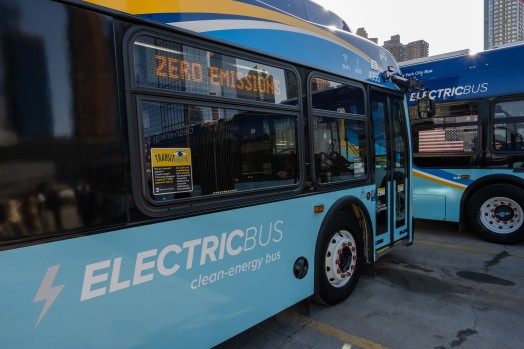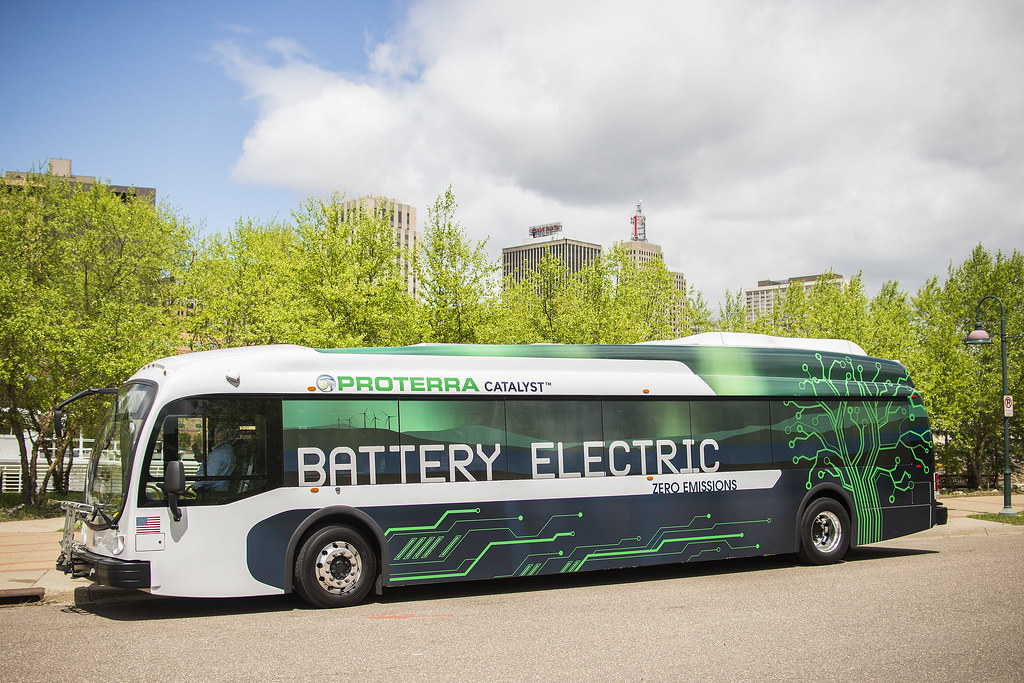A pair of newly expanded federal programs will nearly double the number of electric buses on U.S. roads in one grant cycle alone — if domestic manufacturers can keep up with the demand.
On Tuesday, the Federal Transit Administration announced a record $2.2 billion in competitive grants under the Buses and Bus Facilities and the Low- and No-Emissions Vehicle Programs, which collectively received a staggering 600-percent boost when the Bipartisan Infrastructure Law was signed.

Some of the money will go to supercharge the construction of green transit facilities and programs to train workers on new technologies, but federal officials emphasized that the vast majority will go towards the purchase of clean vehicles themselves. Of the roughly 1,800 buses that the money will help buy, 1,100 will be fully electric, increasing the national e-bus fleet by 85 percent by the time all contracts are fulfilled — and this is just the first of five years for which the historic amount of funding will be available.
Currently, just 2 percent of the roughly 60,000 US buses in service today run entirely on batteries. (For context, comparably sized China, which is far and away the greatest consumer and producer of e-bus technology, has an astonishing fleet of 421,000 green vehicles, which is ; Moscow, which has the largest fleet in Europe, runs 40 percent of its buses on batteries.)
Doubling the minuscule number of e-buses on US roads is a modest start, to be sure — but it's also a critical first step that the agency says it will build on throughout the implementation of the infrastructure law.
"This is the type of headwind that will bring us the momentum that is needed so we can move forward and transition the American bus fleet," said FTA Administrator Nuria Fernandez. "After all, buses really are the workhorse of our transit industry — and as we know, public transit is really an essential public good."
Agencies at 48 states or U.S. territories will be cashing checks soon, including:
- New York City and the Massachusetts Bay Transportation Authority, which received a whopping $116 million each to buy up to 230 buses in the Big Apple and 85 in Beantown, in addition to funding major new workforce development programs in both cities.
- Los Angeles, which got $104 million to buy 160 buses and chargers, as part of a total of $236 million granted to 19 California communities.
- Chicago, which was granted $29 million to be focused largely on modernizing electrical, communications, and safety systems at the Chicago bus garage, as well as buying 10 e-buses.
- Memphis, which won $54 million to build a transit facility that can accommodate 300 vehicles.
- The Tennessee Department of Transportation, which will use $12 million to buy 200 on-demand transit vehicles (including paratransit vehicles) to serve users throughout the state.
- The Kentucky Transportation cabinet, which will stretch its $3-million grant to buy a whopping 47 transit vehicles and add additional service to rural communities.
- The university town of Missoula, Mont., which will reach 90 percent of its goal to electrify its fleet by 2035 with this $11-million grant alone.
Federal officials emphasized that the deluge of money was just the start for America's transit electrification efforts, since several other grant programs under the Bipartisan Infrastructure Law also list e-bus purchases as eligible activities — and the soon-to-be-signed Inflation Reduction Act contains significant tax credits for heavy duty vehicles, too.
The fine print of both pieces of legislation, though, may make delivering on those promises challenging.
According to rules set out by Congress, a total of 70 percent of bus components and subcomponents purchased under FTA programs must be sourced domestically, which could be difficult for U.S. producers already struggling to meet historic demand. New Flyer, the largest transit bus manufacturer in North America, said on a recent earnings call that it has a backlog of 1,900 electric buses, and competitor Proterra told shareholders it's struggling with shortages of wiring harnesses, motors and electrical components due to COVID-19 and the ongoing war in Ukraine.
The Inflation Reduction Act, meanwhile, has even stricter Buy America provisions, which some analysts say will make virtually every electric car on the market ineligible for tax credit thanks to China's dominance of the battery market — never mind electric buses, whose power sources are significantly larger.
A rep from the FTA emphasized that the agency has "had discussions with various transit vehicle manufacturers [and] they are shifting from production of diesel vehicles to battery electric vehicles," and that it's is also actively funding research into increasing production and bringing costs down.
Time will tell if that will be enough — because if the roughly $5 billion in unfunded e-bus grants are any indication, U.S. communities are all too eager to clear their skies and expand their service.
Editor's note: An earlier version of this article misstated the percentage of electric buses in China's fleet.






